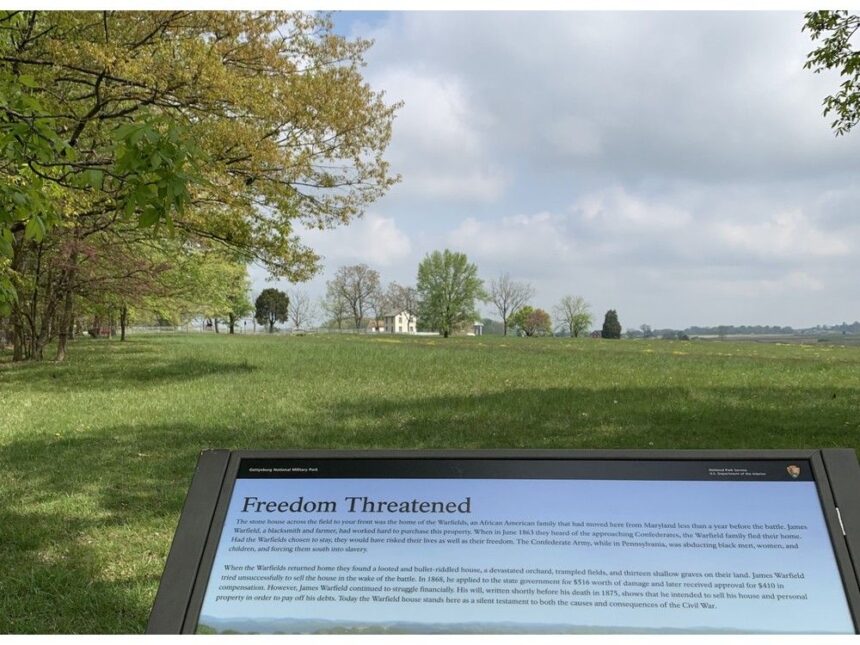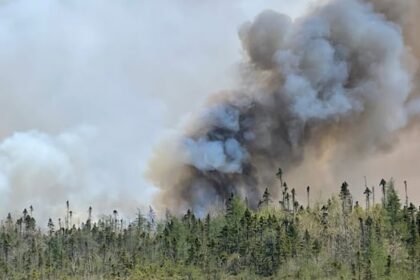Published Mar 30, 2025 • 4 minute readJames Warfield and his family lost all their crops and never financially recovered after Confederate soldiers invaded his Gettysburg farm in 1863. The home has been left as a monument at the Gettysburg National Military Park. Jocelyne Lloyd StaffIn 1863, African American farmer James Warfield and his family were living freely on 13 acres of land above the Mason-Dixon line, earning a living from their farm, blacksmith shop and small orchard.The Warfields had left Maryland a few years before and should have had every reason to believe they were free from the horror of slavery present in the communities to the south. But Warfield and his family lived in Gettysburg, and the threat was heading their way in the form of Confederate soldiers who were reportedly kidnapping and “returning” free Black people to be trafficked as slaves.THIS CONTENT IS RESERVED FOR SUBSCRIBERS ONLY.Subscribe now to access this story and more:Unlimited access to the website and appExclusive access to premium content, newsletters and podcastsFull access to the e-Edition app, an electronic replica of the print edition that you can share, download and comment onEnjoy insights and behind-the-scenes analysis from our award-winning journalistsSupport local journalists and the next generation of journalistsSUBSCRIBE TO UNLOCK MORE ARTICLES.Subscribe or sign in to your account to continue your reading experience.Unlimited access to the website and appExclusive access to premium content, newsletters and podcastsFull access to the e-Edition app, an electronic replica of the print edition that you can share, download and comment onEnjoy insights and behind-the-scenes analysis from our award-winning journalistsSupport local journalists and the next generation of journalistsRegister to unlock more articles.Create an account or sign in to continue your reading experience.Access additional stories every monthShare your thoughts and join the conversation in our commenting communityGet email updates from your favourite authorsSign In or Create an AccountorArticle contentEven white inhabitants of Gettysburg were warned by their governor and Union leaders to harvest their crops, hide their valuables and seek shelter away from the Confederate raids making their way north. Warfield heeded the warning. When the family returned after the Battle of Gettysburg of July 1863, they discovered their house was riddled with bullets, their fields trampled and their orchard ruined. Warfield never financially recovered from the loss.A plaque detailing this episode in American history sits outside the restored Warfield home in the Gettysburg National Military Park, where I was fortunate to visit in March of 2023. Two years later, I am still thinking about the Warfield family, who thought they were safe and secure on the correct side of an artificial line in the “land of the free,” asking for nothing but to go about their daily lives on their own property.Harrowing experiencesWhile I don’t want to exaggerate the situation, it seems the risk of being detained or deported is still present for law-abiding residents and visitors in the U.S.Cassie and Maggie MacDonald of Nova Scotia have been touring the United States as a Celtic folk music duo for 11 years. In early March, they were pulled over by Guernsey County Sheriff’s Office deputies in Ohio, who said their dogs smelled drugs in the vehicle. They then separated the sisters and quizzed them about their movements, while also taking the opportunity to lecture the Nova Scotians about the supposed illegal fentanyl trade pouring over the border.Article content Cassie and Maggie MacDonald make up the Celtic folk duo known as Cassie and Maggie. Photo by CHELLE WOOTTENWhile that incident is not going to keep the MacDonald sisters from future tours to America, another Canadian artist had a much more harrowing experience when she was detained by U.S. Immigration and Customs Enforcement who said she didn’t have the correct documentation to live and work in California.Jasmine Mooney, 35, wrote a first-person account of the two-week ordeal in The Guardian news outlet in the U.K., detailing being stripped of her belongings, sent to unheated and unhygienic detention facilities and even being transported in chains without being given an opportunity to rectify the misunderstanding that led her there.“To put things into perspective: I had a Canadian passport, lawyers, resources, media attention, friends, family and even politicians advocating for me. Yet, I was still detained for nearly two weeks,” Mooney writes. “Imagine what this system is like for every other person in there.”Those other people include Mahmoud Khalil, a permanent resident who was arrested in front of his pregnant wife in their university apartment at Columbia University, and Julio Noriega, a U.S.-born citizen who was surrounded by ICE agents and arrested while buying a pizza in his own neighbourhood.Article contentPlummeting visitationThese scenarios are doing no favours for travel to the U.S., which has dropped steeply in recent months. Statistics Canada numbers from February show a 23 per cent drop in the number of Canadians returning from the U.S. compared to the same period in 2024. Frances Gertsch of Stewart Travel Group in P.E.I. told The Guardian her customers not only don’t want to visit the U.S., they don’t even want to be booked with a travel company that is based in the States.“A lot of people are avoiding the U.S. They’re asking where else can they do the trip. What are the alternatives to this trip that they could do,” she said.“They’re also asking us, which I’m finding really interesting, they’re also asking us about the companies that we’re booking with and are they American companies or not. A year ago I would not have seen that anti-American assessment.” Frances Gertsch of Stewart Travel Group told The Guardian that while her agency doesn’t handle many direct bookings to the U.S., a noticeable shift is occurring among travelers who are hesitant to spend money in America partly due to the trade conflict. ContributedMeanwhile, on the other side of the border, a New York-based tour guide told CTV news that the decline in Canadian visitation is “catastrophic” for his company.“I’ve been a tour guide and a tour guide company owner for two decades plus and anywhere from 30 per cent to 50 per cent of my student group tours that I assign to my 15-plus tour guides, are Canadian,” Matt Levy of Spread Love Tours said.“In 2024, Canadian high school class trips to New York City made up $35,000 of my gross profit. This year, it’s $5,000 and declining.”Well, no wonder. Add all this to the fact the American president routinely threatens to invade Canada and make our sovereign country the “51st state,” and I can confidently say my 2023 trip to the United States will be my last for the foreseeable future.Jocelyne Lloyd is managing editor of The Guardian and lives in Charlottetown.Article content
JOCELYNE LLOYD: Gettysburg is not the distant past











